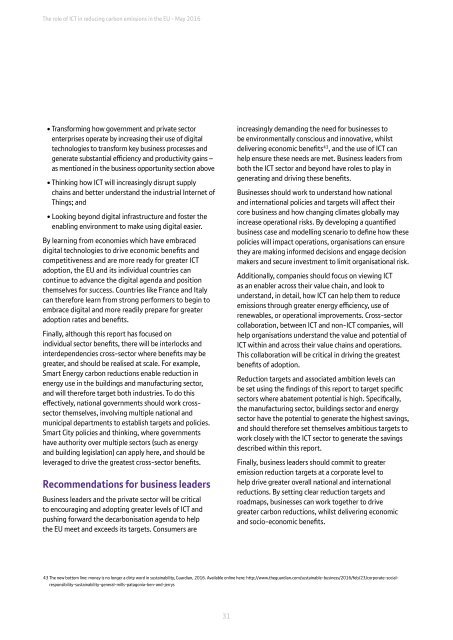The role of ICT in reducing carbon emissions in the EU
ICT_Carbon_Reduction_EU
ICT_Carbon_Reduction_EU
Create successful ePaper yourself
Turn your PDF publications into a flip-book with our unique Google optimized e-Paper software.
<strong>The</strong> <strong>role</strong> <strong>of</strong> <strong>ICT</strong> <strong>in</strong> reduc<strong>in</strong>g <strong>carbon</strong> <strong>emissions</strong> <strong>in</strong> <strong>the</strong> <strong>EU</strong> - May 2016<br />
• Transform<strong>in</strong>g how government and private sector<br />
enterprises operate by <strong>in</strong>creas<strong>in</strong>g <strong>the</strong>ir use <strong>of</strong> digital<br />
technologies to transform key bus<strong>in</strong>ess processes and<br />
generate substantial efficiency and productivity ga<strong>in</strong>s –<br />
as mentioned <strong>in</strong> <strong>the</strong> bus<strong>in</strong>ess opportunity section above<br />
• Th<strong>in</strong>k<strong>in</strong>g how <strong>ICT</strong> will <strong>in</strong>creas<strong>in</strong>gly disrupt supply<br />
cha<strong>in</strong>s and better understand <strong>the</strong> <strong>in</strong>dustrial Internet <strong>of</strong><br />
Th<strong>in</strong>gs; and<br />
• Look<strong>in</strong>g beyond digital <strong>in</strong>frastructure and foster <strong>the</strong><br />
enabl<strong>in</strong>g environment to make us<strong>in</strong>g digital easier.<br />
By learn<strong>in</strong>g from economies which have embraced<br />
digital technologies to drive economic benefits and<br />
competitiveness and are more ready for greater <strong>ICT</strong><br />
adoption, <strong>the</strong> <strong>EU</strong> and its <strong>in</strong>dividual countries can<br />
cont<strong>in</strong>ue to advance <strong>the</strong> digital agenda and position<br />
<strong>the</strong>mselves for success. Countries like France and Italy<br />
can <strong>the</strong>refore learn from strong performers to beg<strong>in</strong> to<br />
embrace digital and more readily prepare for greater<br />
adoption rates and benefits.<br />
F<strong>in</strong>ally, although this report has focused on<br />
<strong>in</strong>dividual sector benefits, <strong>the</strong>re will be <strong>in</strong>terlocks and<br />
<strong>in</strong>terdependencies cross-sector where benefits may be<br />
greater, and should be realised at scale. For example,<br />
Smart Energy <strong>carbon</strong> reductions enable reduction <strong>in</strong><br />
energy use <strong>in</strong> <strong>the</strong> build<strong>in</strong>gs and manufactur<strong>in</strong>g sector,<br />
and will <strong>the</strong>refore target both <strong>in</strong>dustries. To do this<br />
effectively, national governments should work crosssector<br />
<strong>the</strong>mselves, <strong>in</strong>volv<strong>in</strong>g multiple national and<br />
municipal departments to establish targets and policies.<br />
Smart City policies and th<strong>in</strong>k<strong>in</strong>g, where governments<br />
have authority over multiple sectors (such as energy<br />
and build<strong>in</strong>g legislation) can apply here, and should be<br />
leveraged to drive <strong>the</strong> greatest cross-sector benefits.<br />
Recommendations for bus<strong>in</strong>ess leaders<br />
Bus<strong>in</strong>ess leaders and <strong>the</strong> private sector will be critical<br />
to encourag<strong>in</strong>g and adopt<strong>in</strong>g greater levels <strong>of</strong> <strong>ICT</strong> and<br />
push<strong>in</strong>g forward <strong>the</strong> de<strong>carbon</strong>isation agenda to help<br />
<strong>the</strong> <strong>EU</strong> meet and exceeds its targets. Consumers are<br />
<strong>in</strong>creas<strong>in</strong>gly demand<strong>in</strong>g <strong>the</strong> need for bus<strong>in</strong>esses to<br />
be environmentally conscious and <strong>in</strong>novative, whilst<br />
deliver<strong>in</strong>g economic benefits 43 , and <strong>the</strong> use <strong>of</strong> <strong>ICT</strong> can<br />
help ensure <strong>the</strong>se needs are met. Bus<strong>in</strong>ess leaders from<br />
both <strong>the</strong> <strong>ICT</strong> sector and beyond have <strong>role</strong>s to play <strong>in</strong><br />
generat<strong>in</strong>g and driv<strong>in</strong>g <strong>the</strong>se benefits.<br />
Bus<strong>in</strong>esses should work to understand how national<br />
and <strong>in</strong>ternational policies and targets will affect <strong>the</strong>ir<br />
core bus<strong>in</strong>ess and how chang<strong>in</strong>g climates globally may<br />
<strong>in</strong>crease operational risks. By develop<strong>in</strong>g a quantified<br />
bus<strong>in</strong>ess case and modell<strong>in</strong>g scenario to def<strong>in</strong>e how <strong>the</strong>se<br />
policies will impact operations, organisations can ensure<br />
<strong>the</strong>y are mak<strong>in</strong>g <strong>in</strong>formed decisions and engage decision<br />
makers and secure <strong>in</strong>vestment to limit organisational risk.<br />
Additionally, companies should focus on view<strong>in</strong>g <strong>ICT</strong><br />
as an enabler across <strong>the</strong>ir value cha<strong>in</strong>, and look to<br />
understand, <strong>in</strong> detail, how <strong>ICT</strong> can help <strong>the</strong>m to reduce<br />
<strong>emissions</strong> through greater energy efficiency, use <strong>of</strong><br />
renewables, or operational improvements. Cross-sector<br />
collaboration, between <strong>ICT</strong> and non-<strong>ICT</strong> companies, will<br />
help organisations understand <strong>the</strong> value and potential <strong>of</strong><br />
<strong>ICT</strong> with<strong>in</strong> and across <strong>the</strong>ir value cha<strong>in</strong>s and operations.<br />
This collaboration will be critical <strong>in</strong> driv<strong>in</strong>g <strong>the</strong> greatest<br />
benefits <strong>of</strong> adoption.<br />
Reduction targets and associated ambition levels can<br />
be set us<strong>in</strong>g <strong>the</strong> f<strong>in</strong>d<strong>in</strong>gs <strong>of</strong> this report to target specific<br />
sectors where abatement potential is high. Specifically,<br />
<strong>the</strong> manufactur<strong>in</strong>g sector, build<strong>in</strong>gs sector and energy<br />
sector have <strong>the</strong> potential to generate <strong>the</strong> highest sav<strong>in</strong>gs,<br />
and should <strong>the</strong>refore set <strong>the</strong>mselves ambitious targets to<br />
work closely with <strong>the</strong> <strong>ICT</strong> sector to generate <strong>the</strong> sav<strong>in</strong>gs<br />
described with<strong>in</strong> this report.<br />
F<strong>in</strong>ally, bus<strong>in</strong>ess leaders should commit to greater<br />
emission reduction targets at a corporate level to<br />
help drive greater overall national and <strong>in</strong>ternational<br />
reductions. By sett<strong>in</strong>g clear reduction targets and<br />
roadmaps, bus<strong>in</strong>esses can work toge<strong>the</strong>r to drive<br />
greater <strong>carbon</strong> reductions, whilst deliver<strong>in</strong>g economic<br />
and socio-economic benefits.<br />
43 <strong>The</strong> new bottom l<strong>in</strong>e: money is no longer a dirty word <strong>in</strong> susta<strong>in</strong>ability, Guardian, 2016. Available onl<strong>in</strong>e here: http://www.<strong>the</strong>guardian.com/susta<strong>in</strong>able-bus<strong>in</strong>ess/2016/feb/23/corporate-socialresponsibility-susta<strong>in</strong>ability-general-mills-patagonia-ben-and-jerrys<br />
31


